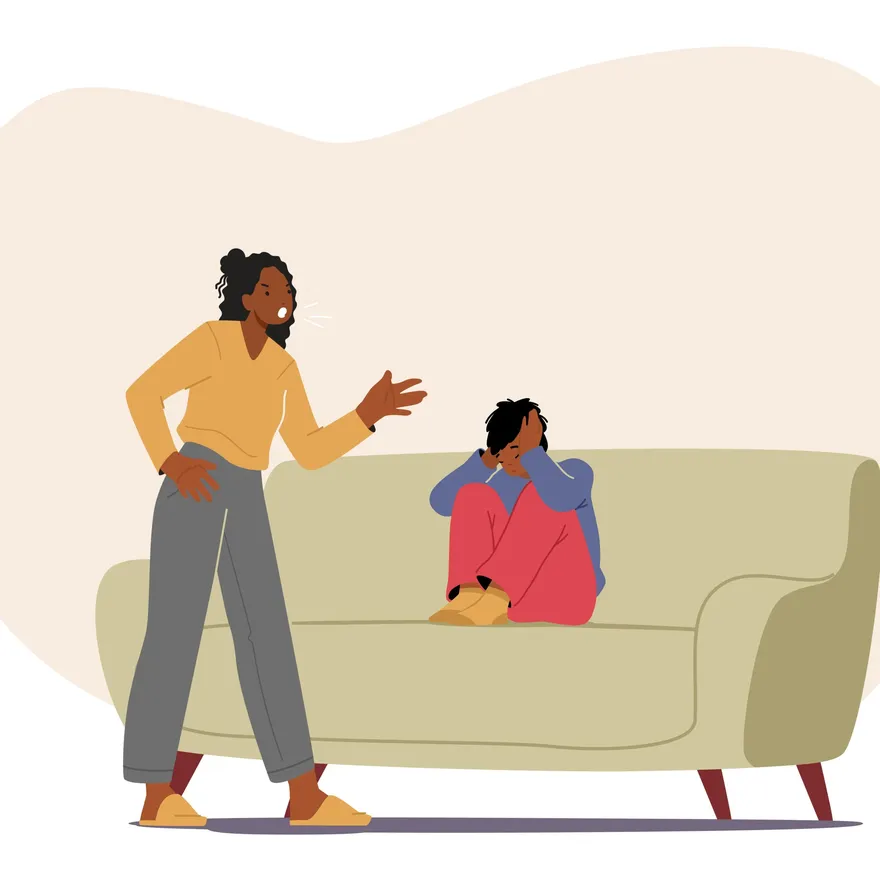It's Not My Fault!
In this Hidden Brain episode, neuroscientist Emily Falk and host Shankar Vedantam examine why people often react defensively to feedback and suggestions for improvement. They explore how our brains naturally associate "me" with "good," creating an inherent resistance to criticism, even when we believe in the concept of self-improvement.
The discussion covers practical strategies for reducing defensive reactions, including the technique of imagining giving advice to a friend rather than focusing on oneself. Falk and Vedantam also delve into how defensiveness relates to core identity, explaining why people are more resistant to feedback about fundamental traits than peripheral ones. The episode presents research on how storytelling and connecting with personal values can help individuals become more receptive to feedback.

This is a preview of the Shortform summary of the Sep 15, 2025 episode of the Hidden Brain
Sign up for Shortform to access the whole episode summary along with additional materials like counterarguments and context.
1-Page Summary
Psychology of Defensiveness and why We Resist Feedback
When faced with feedback or suggestions for improvement, people often respond with defensiveness rather than embracing the opportunity for growth. Emily Falk explains that this occurs because our brains naturally equate "me" with "good," making feedback feel like a threat to our self-image. This creates a paradox: while we believe in self-improvement, we resist changes suggested by others.
Strategies For Reducing Defensiveness
Experts Emily Falk and Shankar Vedantam offer several effective approaches to decrease defensiveness. One key strategy is reducing self-salience - for instance, imagining giving advice to a friend rather than focusing on ourselves. Falk points out that this approach has shown success in real-world applications, such as reducing college students' alcohol consumption.
Another powerful strategy involves affirming core values before receiving feedback. Falk shares that she practices mini-affirmation exercises, like looking at photos of her children, before feedback meetings. These exercises remind us that a single criticism doesn't define our entire being.
Self, Identity, and Purpose in Defensive Reactions
Vedantam explains that defensiveness isn't just about protecting specific actions - it's about defending our core identity. Falk's research shows that people are particularly defensive about feedback that challenges traits central to their identity, while being more open to changing views on less fundamental characteristics.
Falk emphasizes that connecting with one's sense of purpose can make individuals more receptive to feedback. She also highlights the effectiveness of storytelling in reducing defensiveness, noting that when people engage with stories, they process information differently and show less resistance to change. This occurs because stories activate brain systems associated with understanding others' thoughts and feelings, creating a more analytical mindset compared to direct criticism.
1-Page Summary
Additional Materials
Actionables
- You can practice self-distancing by journaling about a challenging situation as if you were advising a friend. This helps you view feedback more objectively and less defensively. For example, write down a piece of feedback you've received and then respond to it in third person, offering advice as though you were talking to someone else facing the same issue.
- Before entering a situation where you might receive feedback, take a few minutes to write down your core values and how they've guided your past successes. This affirmation exercise can make you more open to constructive criticism by reinforcing your self-worth and reducing the impact of feedback on your identity.
- Create a feedback story exchange with a friend or colleague where you both share past experiences with feedback, focusing on the emotions and thoughts it triggered. By actively listening to each other's stories, you can develop empathy and a better understanding of how to receive feedback without feeling defensive.
Get access to the context and additional materials
Psychology of Defensiveness and why We Resist Feedback
Understanding the psychological mechanisms behind defensiveness can illuminate why we often resist feedback instead of using it as a tool for growth.
Common Defensiveness to Suggestions or Criticism
When suggestions for improvement are offered, people frequently exhibit defensiveness, making attempts to preserve their self-image and the status quo rather than embracing change.
Brains Equate "Me" With "Good," Making Feedback Threatening
Falk articulates that observing aspects that could be improved in others can be perceived as a threat to our self-image, leading to defensiveness. When people process feedback about poor choices or behaviors, it tends to be experienced as an affront to their identity due to the brain's conflation of the self with goodness. Thus, receiving feedback is often equated with a challenge to one's notion of being good.
Defensiveness Preserves Status Quo and Self-Image
The automatic response to feedback is generally anger, denial, or justification instead of openness to consider the validity of the criticism. For example, when Emily's grandmother wished for more quality time together, Emily's immediate reaction was defensiveness, not because of the factual time spent together but because it posed a question on her identity as a good granddaughter. The inherent need to believe ...
Here’s what you’ll find in our full summary
Psychology of Defensiveness and why We Resist Feedback
Additional Materials
Clarifications
- The contradiction between self-perception and the natural inclination towards self-improvement highlights the conflict individuals face when receiving feedback. While people generally desire personal growth, they often struggle to accept feedback that challenges their self-image. This contradiction stems from the discomfort of acknowledging areas for improvement that may contradict one's existin ...
Get access to the context and additional materials
Strategies For Reducing Defensiveness
Experts like Emily Falk and Shankar Vedantam suggest various strategies for reducing defensiveness, which can help us receive feedback productively and improve our receptiveness to change.
Reducing Self-Salience Decreases Defensiveness
It is suggested that by reducing the prominence of the self, we can become less defensive and more open to feedback.
Imagining Giving Advice to a Friend Makes People More Open to Feedback
Emily Falk emphasizes that we can control our response to feedback. She suggests that approaching our own behavior from the psychological distance of giving advice to a friend can make us more open to change, as evidenced by a study where such an approach reduced college students' alcohol consumption.
Meditation can also play a role in letting go of a bounded notion of self, influencing the brain's self-relevant systems and potentially leading to reduced defensiveness among long-term practitioners.
Affirming Core Values and Purpose Can Reduce Defensiveness
Reflecting on one's core values can lessen the impact of criticism and reduce defensiveness.
Reflecting On What Matters Lessens Threat From Criticism
Falk points out that reminding ourselves of our values and what truly matters can make us less defensive when faced with criticism. Values affirmation exercises include reflecting on aspects of life that bring meaning or purpose, such as family, spirituality, or creativity. This practice helps people understand that a single mistake does not define their entire being.
For instance, when sedentary individuals first performed a values affirmation exercise, they were more responsive to health coaching, indicating they were more open to change. Before feedback meetings, Falk engages in mini affirmation exercises, like looking at photos of her children or reflecting on gratitude, which make her more receptive to feedback.
Falk also notes the link between purposeful behavior and receptiveness to constructive feedback. She mentions the natural fluctuations in individuals' sense of purpose and how behaviors beneficial for the body can lead to a more purposeful feeling.
Expanding Self-Understanding Through Transformative Experiences
Vedantam and Falk discuss how expanding our self-conce ...
Here’s what you’ll find in our full summary
Strategies For Reducing Defensiveness
Additional Materials
Clarifications
- Self-salience is the concept of how much importance or focus an individual places on themselves in a given situation. It involves the degree to which a person considers themselves central or prominent in a particular context. Reducing self-salience means diminishing the emphasis on oneself, which can lead to decreased defensiveness and increased openness to feedback. This reduction in self-focus can help individuals be more receptive to external perspectives and suggestions for personal growth.
- Psychological distance of giving advice to a friend involves mentally stepping back from a situation and viewing it as if you were advising a friend facing a similar issue. This perspective shift can help detach personal emotions and biases, allowing for a more objective evaluation of one's behavior or choices. By adopting this approach, individuals can potentially become more open to feedback and willing to consider change, as they are less defensive when critiquing themselves from a friend's standpoint. This technique leverages the familiarity and empathy typically associated with giving advice to someone else to promote self-reflection and growth.
- Values affirmation exercises involve reflecting on personal values that are important to an individual, such as family, spirituality, or creativity. By focusing on these core values, individuals can strengthen their sense of self-worth and purpose, which can help reduce defensiveness when faced with criticism or feedback. These exercises aim to remind individuals of what truly matters to them, beyond specific mistakes or shortcomings, fostering a more open and receptive mindset towards personal growth and change. Values affirmation can be a powerful tool in enhancing resilience and improving receptiveness to constructive feedback.
- A fluctuating sense of purpose refers to the varying levels of clarity and motivation individuals feel towards their goals and aspirations over time. It acknowledges that one' ...
Counterarguments
- While reducing self-salience may decrease defensiveness, it could also lead to a diminished sense of accountability or personal responsibility in some cases.
- Imagining giving advice to a friend might not always translate to being more open to feedback, as some individuals may struggle to apply the same level of empathy or understanding to their own situations.
- Meditation may not be a universally effective tool for reducing defensiveness, as individuals may have different responses to meditation based on their personal beliefs, experiences, or mental health conditions.
- Affirming core values and purpose as a means to reduce defensiveness might not be effective for everyone, especially if an individual's values are the source of the criticism or if they are experiencing a values conflict.
- Reflecting on what matters to lessen the threat from criticism assumes that individuals have a clear understanding of their values, which may not be the case for everyone, particularly those in transitional life stages or experiencing identity crises.
- Values affirmation exercises could potentially lead to a reinforcement of confirmation bias, where individuals only accept feedback that aligns with their pre-existing beliefs and values.
- The effectiveness of values affirmation exercises in making individuals more responsive to coaching could vary widely depending on the individual's openness to change and the context of the feedback.
- Engaging in transformative experiences to reduce ego-defensiveness may not be practical or appealing to all individuals, and the effects of such experiences can be temporary or vary g ...
Get access to the context and additional materials
Self, Identity, and Purpose in Defensive Reactions
Emily Falk and Shankar Vedantam explore the complex relationship between our core identity, self-concept, and the defensiveness demonstrated when we receive personal feedback.
Self-Concept, Identity, and Defensiveness
Vedantam describes how defensiveness isn't simply about defending specific actions; it's about defending an attack on one's overall sense of self. This defensiveness emerges whenever feedback targets an aspect of our identity that is significant to us.
Feedback Challenging Our Core Identity Feels Threatening
Emily shares her initial response of defensiveness to her grandmother's critique, which felt like an affront to her self-image as a considerate and engaged family member. Falk discusses research that shows people are especially defensive about feedback that challenges traits they consider central to their identity, such as kindness or generosity. They are more open to changing their views on traits not seen as fundamental, like being articulate. For instance, when Brett commented on Emily's phone use, it struck a nerve because it questioned her identity as a responsible boss and scientist, roles that she holds valuable and are reasons she uses her phone frequently.
Purpose Fosters Openness to Feedback and Change
Without giving specifics, Falk relates that recognizing and adhering to one’s purpose can inspire greater openness to feedback and an improved capacity to handle criticism constructively.
Purpose-Driven People Embrace Constructive Criticism
Falk speaks about reconnecting with one's fundamental motivations before receiving feedback. Acknowledging shared objectives, such as broadening the reach of research, can help individuals recognize and embrace comments that might initially seem negative. This process can involve daily fluctuations in how purposeful one feels, influenced by reflecting on values and partaking in meaningful activities. Individuals more connected to their sense of purpose are also more likely to pursue and continue behaviors beneficial to their overall health and wellbeing.
Stories and Perspective-Taking Reduce Defensiveness By Separating Feedback From the Core Self
The power of storytelling emerges as a formidable tool to displace defensiveness and allow for a different kind of information processing that’s less tied to an individual's core self-identity.
Listening To Others' Experien ...
Here’s what you’ll find in our full summary
Self, Identity, and Purpose in Defensive Reactions
Additional Materials
Counterarguments
- While defensiveness can be about protecting one's overall sense of self, it can also be a reflexive, unthinking response to unexpected or unwelcome feedback, not necessarily tied to core identity.
- Some individuals may not feel threatened by feedback challenging their core identity if they have a strong sense of self-worth or if they view feedback as an opportunity for growth.
- People may also be defensive about traits that are not central to their identity due to insecurities or misconceptions about the importance of those traits.
- Purpose may inspire openness to feedback, but it can also lead to rigidity if individuals become too focused on a specific goal or view of themselves.
- Purpose-driven individuals might sometimes reject constructive criticism if it conflicts with their sense of purpose or if they believe it undermines their mission.
- Connecting with one's purpose is not the only way to help embrace negative feedback; other strategies like mindfulness or cognitive restructuring can also be effective.
- Being purposeful does not guarantee the pursuit of behaviors beneficial to health, as some individuals may be purposeful in ways that are detrimental to their well-b ...
Actionables
- Create a personal purpose statement to guide your response to criticism. Write down what drives you, whether it's personal growth, contributing to your community, or excelling in your career. Refer to this statement when you receive feedback to remind yourself that criticism is a tool for achieving your goals, not an attack on your identity.
- Start a feedback journal to track your reactions and progress. Whenever you receive feedback, note down your initial emotional response, the content of the feedback, and how it can help you move closer to your purpose. Over time, this will help you see patterns in your defensiveness and learn to dissociate feedback from your self-worth.
- Engage with diverse narratives through books, movie ...
Get access to the context and additional materials
Create Summaries for anything on the web
Download the Shortform Chrome extension for your browser






